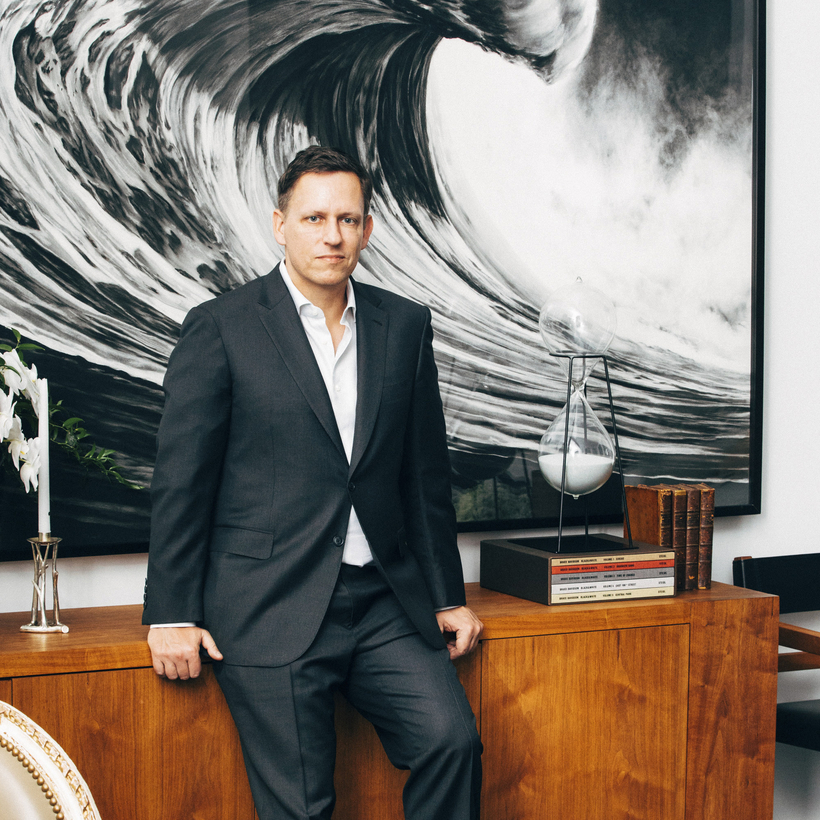Earlier this month, J. D. Vance, a Republican Senate candidate from Ohio and author of the controversial best-seller Hillbilly Elegy, was asked about what he has said is one of the key issues that will define the 2022 elections: the supposed tyranny of the big technology companies.
Vance has promised to try to rein in companies such as Apple, Facebook, and Google as part of a populist, far-right platform, one that also calls for hard-line immigration reform and a ban on the teaching of so-called critical race theory in schools. In an ad earlier this year created by a political-action committee, Vance railed against “an elite who don’t actually care about the American nation,” as an image of Mark Zuckerberg flashed across the screen.

Criticisms of big tech ring more than a little hollow coming from a guy whose main backer is 53-year-old Peter Thiel, the Silicon Valley venture capitalist and Facebook board member. Thiel has pledged $10 million to the same Vance-aligned PAC that ripped the Facebook founder.
Vance has waived off any suggestion of hypocrisy. As he told Jewish Insider earlier this month, “We agree on many things and we disagree on things, too, but on the tech issue in particular, I think Peter has been pretty far out there the last few years making some of the same arguments I’ve made, which is, basically, these companies are way too powerful.”
There are all sorts of things you could say about this—and Vance’s foes have had lots of fun pointing out that he is the rare anti-tech populist backed by a tech billionaire—but to me it signifies another chapter in what has to be the strangest and most fraught relationship between moguls: the friendship and rivalry between Peter Thiel and Facebook founder Mark Zuckerberg.
Thiel v. Zuckerberg
As I write in my new biography of Thiel, The Contrarian, the tech investor has been simultaneously playing two roles: first, as a defender and confidant to Zuckerberg, and second, as a secret counterrevolutionary.

In the book, I reveal how Thiel, who was Facebook’s first investor and is its longest-serving board member, has provided financial support to activists who have made it their business to mess with Zuckerberg, caused embarrassing details about Facebook-board deliberations to leak to the press, and is now backing two Senate candidates who have turned Zuckerberg into their favorite punching bag. (Blake Masters, a longtime Thiel employee, who is riding a second $10 million contribution from his boss to an Arizona Senate bid, recently called Facebook “sick and disgusting” and accused tech companies of possibly “swinging a presidential election.”)
Why would Thiel attack his own company? Ideology may play a role. It’s true, as numerous sources told me in the course of my reporting, that Thiel is ambivalent about Facebook—as many Americans are. He may agree with Masters and Vance that the company should be regulated more tightly. But needling Facebook also serves a political purpose for Thiel and his allies, one that has nothing to do with breaking the company up. By relentlessly accusing it of discriminating against conservatives, Thiel’s candidates are putting pressure on Zuckerberg to cater to the right.

There’s also the question of why Zuckerberg, who controls Facebook through a special class of shares, would tolerate this. Why not just fire Thiel?
I suspect he may at some point—though, if he were to dismiss Thiel, it would arguably make his life even more difficult. For now, Thiel’s allies are focusing more heat on Google than on Facebook, but you can bet that they would make hay out of his “cancellation” from the company’s board.
And so Thiel will likely continue to play both sides: he will enjoy his influence at the largest media company in human history (three billion users and counting) and will get to set the agenda according to a growing far-right movement. It’s a rare kind of power, and a good reason why Thiel is worthy of scrutiny.
Max Chafkin’s The Contrarian: Peter Thiel and Silicon Valley’s Pursuit of Power is out now from Penguin Press

